"HOW TO BE A BETTER POLICY ADVISOR
in Public Administration Reforms in selected Central Asia countries"
Training course for advisors
Almaty, Kazakhstan, June 26-29, 2005 (Russian language)
written by Bolotbek Orokov, leading trainer
A training course for advisors “How to be a better Policy Advisor” was implemented in Almaty, Kazakhstan on June 26-29, 2005 by NISPAcee in cooperation with the local partner Public Policy Research Center. The training was organized with the support of SlovakAid within the project “HOW TO BE A BETTER POLICY ADVISOR in Public Administration Reforms in selected Balkan and Central Asia countries”.
The training was led by an international team of NISPAcee trainers - Bolotbek Orokov (The Academy of Management under the President of the Kyrgyz Republic, Bishkek, Kyrgyzstan), Meruert Makhmutova (Public Policy Research Center, Almaty, Kazakhstan) and Zulfiya Tukhtakhodjaeva (Consulting Company “Imkon-Presta”, Tashkent, Uzbekistan).
The main objective of the training course is to provide the academics with an opportunity to begin the development of their knowledge and skills on public policy advice design and channels for the delivery.
The training course was conducted for 20 participants from 4 targeted Central Asian countries - Kazakhstan, Kyrgyzstan, Tajikistan, and Uzbekistan. Participants of the training course work as policy advisors or are interested in participation in policy advice delivery to their central and local governments, international organizations, and other clients and would like to upgrade their knowledge and skills. They are people of different ages and have different degrees starting from bachelor till the doctoral ones in various areas of expertise such as economics, law, political sciences, education, public policy and others. They hold different posts in their respective institutions: some of them are just starting academic activity and some of them are rather experienced researchers and lecturers. The group was rather diverse; however, their current research and teaching activities are focusing on various aspects of public administration reforms in their countries. Their advising projects are also in various areas of public administration reforms such as civil service system, election system, strengthening national parliament, decentralization and developing local self-governance, support to the reform of fiscal system, border management and many others. In describing the reason for participation in the training course all of them stated that they would like to build or strengthen their advisory capacities and expected this training will provide this opportunity for them. In particular, they expected to develop analytical skills or skills of advising, to learn more about methods of problem analysis, public policy and its cycle.
After the implementation of the training course all participants pointed out that the course is really helpful, useful, and needed to them. Ms. Khusanova Nodira from Uzbekistan said that even though she considered herself as an experienced advisor, she found the training helpful in seeing other views on what policy advising is and its difference with classical academic research. She learnt that not only analytical skills, but some other advisory skills such as communication skills are also important for advisors. Now she sees policy advisors must be not only good idea generators, but also good idea communicators. Jumagul Esenalieva, participant from Kyrgyzstan, said that she is specialized in two areas: business law and education. This training gave her an opportunity to learn about the policy cycle, to learn more about government environment and for the first time think that policy advisor is a person who must use a multidisciplinary approach that is much broader than just one area of expertise. The knowledge and skills obtained during the training course will certainly help her in providing better assistance to build a school for border officers in Kyrgyzstan.
Having participated in this training all participants expressed the view that it should not be final activity. All of them felt the desperate need to work more on their personal advisory capacity strengthening. They believe NISPAcee will certainly offer them new steps in implementing these hopes. It is important especially for the Central Asian region as far as all targeted countries are facing enormous challenges in the development of democratic societies and policy advisors can play here a very important role.
--------------
Nodira Khusanova, Uzbekistan
I was satisfied of the teaching approaches used by our trainers and their high competence of the subject. Being a teacher with more than 20 years experience, I could learn from them different interactive teaching ideas that I'm going to use in my future practice.
Since I feel much mature as a public policy advisor now, I'd like to propose short-term trainings for my colleagues in the International Business School, who is interested in providing consulting services for different clients. We also are going to launch new short-term seminars for government mid-career level officials (IBS has some experience in this), as well as non-governmental organizations specialists on Public Policy and Non-for-profit Management.
The participants of Almaty seminar were selected perfectly. It was much pleasure to meet all those people, who are high professionals in their areas and very good communicable people. We still keep in touch with them and full of enthusiasm to continue our communications and professional cooperation.
--------------
Almagul Zhumabekova, Kazakhstan
Through the rich and diverse content I was able to know more about policy paper, knowledge which was helped me in my job as a lecturer. Similarly, I was able to share the experiences and lessons learned with my colleagues. The found it quite useful and are adapting some to their own job. Equally significant were the classes I derived from interacting with course mates from different job from mine. It really helped in broadening my vision and understanding of how to be a really good policy advisor.
So I feel it was a rare chance to participate in this training. What.s more, we attained more information about worldwide government policy papers (Green and White), measures and successful experiences related in CIS. We.ll continue to work actively and effectively to develop, promote and implement policies advises, and look forward to assisting public officers and lecturers to fulfill their potential , so that they may look to the future with confidence and optimism.
--------------
Askarbek Mambetaliev, Kyrgyzstan
I think that the training was the excellent opportunity to develop skills necessary for an effective policy advisor. Through well-organized workshops, interactive seminars and open discussions I got better idea of the nature of work in multicultural groups and learned how to do attention-grabbing presentations. The training also helped me to contemplate on the development process of public policy advising, especially on monitoring and evaluation strategies.
I believe that any project needs effective methods for monitoring and evaluation to perform better results on the next circle of the development. Therefore, the idea presented by NISPAcee training can be applied in many aspects of life. Would be great to continue such trainings in the region.
--------------
Durbek Mukhamedov, Uzbekistan
I would like to establish course on Public Administration course in the frame of the Institute of Management at the University of World Economy and Diplomacy. I will use materials which I received during the seminar in Almaty and some other materials for establishing this course. I am planning also use some materials from NISPA website.
--------------
Jumagul Esenalieva, Kyrgyzstan
Using this opportunity I would like to thank you and all NISPAcee staff for organizing this training course for academic advisors.
This training was well thought-out and logical in terms of its topics and their order of presenting.
The best practices of interactive teaching methods used during this training have resulted a balance between the delivery of information and opportunities for listeners to apply that information in hands-on practice, exercises, case studies, role plays etc.
The trainers selected for this training are highly qualified specialists and fully meet the requirements for this kind of training.
I would particularly mention an excellent administration of this training. It was a well-coordinated work at all stages (pre-training work, training process, cultural programme, etc.).
I think that the best criteria for assessing any kind of work is its successful or unsuccessful implementation. This training resulted the following contributions to my professional activity: review all my previous professional background in the light of advisory capacity; re-identify my current working position; make some practical corrections in my ToR; conceive my personal advisory qualities and skills; adjust my current activity according to conceived advisory qualities and skills. This is only an initial stage. I hope that more significant outcomes are in a foreseeable future.
--------------
Rustamjon Urinboev, Uzbekistan
I am sure that this training course changed me in many positive ways. Actually, as a student I can say for sure that this training course was well-organized and worth participating because it dealed with such important issues that current Central Asian states would consider. As for the training experience, I gained much experience regarding the skills of policy advisor in such spheres as policy analysis, policy paper and etc. I believe that I will realize NISPAcee training experience in relevant positions.
I am determined to assist my government in democratization processes and the knowledge and expertise obtained at the training course would be very useful in fulfilling my professional and academic objectives.
Participants
Ms.
Mrs.
Ms.
Mr.
Mr.
Mr.
Ms.
Ms.
Ms.
Ms.
Mr.
Ms.
Mr.
Mr.
Mrs.
Mr.
Mr.
Mr.
Mr.
Mr.
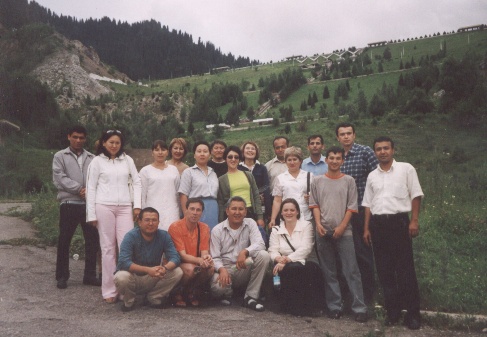
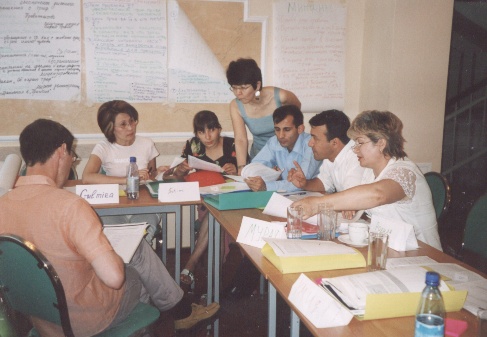

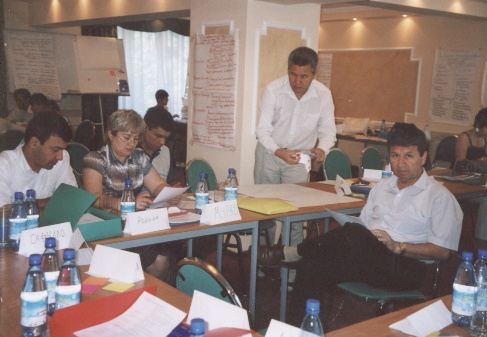
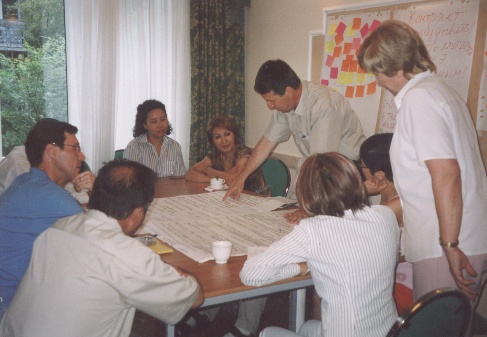
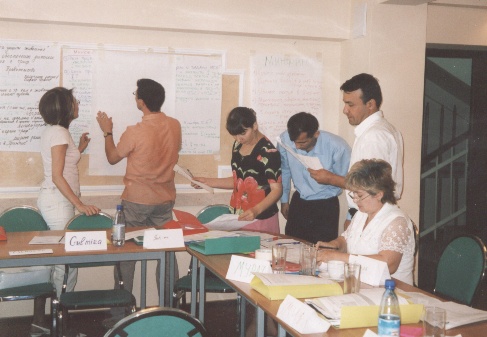




 Price:
Price: 








